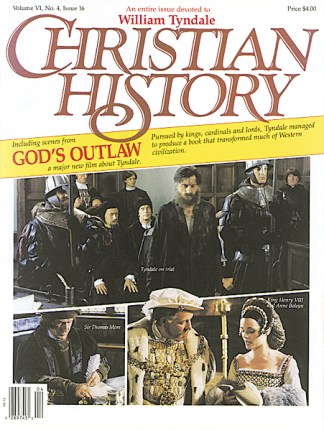That William Tyndale translated and published, in 1526, the first-ever mechanically-printed New Testament in the English language?
That he did this in an era when the English Catholic church had in effect a law that made it a crime punishable by death to translate the Bible into English, and when on one day in 1519, the church authorities publicly burned a woman and six men for nothing more than teaching their children English versions of the Lord’s Prayer, the Ten Commandments and the Apostles’ Creed?!
That Tyndale’s translations (he produced multiple editions) were so fundamentally correct and so generally smooth in word flow that more than 90 percent of his wordings appeared in the King James Version that was published nearly 100 years later, and more than 75 percent of his wordings appear in the Revised Standard Version of 1952?
That at about the age of 42, he was strangled and then burned at the stake for the heresies of translating the Bible into English and questioning the authority of the pope and the established church?
That many of the English Catholic parish priests in Tyndale’s day were so corrupt that they were widely known as “common drunkards” and regular hosts at their abbeys to “brothel women”? Even Cardinal Thomas Wolsey, the pope’s personal representative in England, lived with a “wife” for several years and had two children, then gave her away to another man, complete with dowry!
That in their efforts to suppress circulation of Tyndale’s first edition of an English New Testament, the English Catholic authorities wasted the equivalent of several thousand dollars trying to buy up and burn all the copies he’d had printed? And they did this twice! The waste to them was that their funds, funnelled secretly back to Tyndale, made it possible for him to print up even more copies of subsequent editions.
That this simple Englishman, probably of common stock, was reputed by at least one scholarly acquaintance to have mastered seven languages, including “Hebrew, Greek, Latin, Italian, Spanish, English [and] French”? In addition, he was obviously more-than-familiar-enough with German to translate and interpret even the finest points of Luther’s writings.
That despite it being severely against the English Catholic church’s law in that day to possess a copy of Tyndale’s Obedience of the Christian Man, Lady Anne Boleyn possessed a copy and passed it on to King Henry VIII, who loved it and said, “This book is for me and all kings to read.”
That soon after this, King Henry decided he needed a writer and scholar like Tyndale to advance his cause of gaining a divorce from his first wife and establishing himself as a higher authority in England than the pope, so he sent agents after Tyndale to offer him a salary and safe passage back to England?
That Tyndale respectfully refused this offer, saying he would return to England only if the king granted approval and made arrangements for the Bible to be translated into the English language?
That less than a year after Tyndale’s martyrdom, Henry gave his official approval to an English Bible that, unbeknownst to him, was nearly 70 percent composed of Tyndale’s work? The king proclaimed, “If there be no heresies in it, let it be spread abroad among all the people!”
Copyright © 1987 by the author or Christianity Today/Christian History magazine. Click here for reprint information on Christian History.










